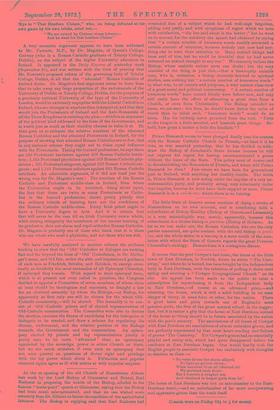It seems that the poet Cowper's last home, the house
at the little town of East Dereham, in Norfolk, where he wrote "The Cast- away," and where he is buried, has been bought by the Independent body in East Dereham, with the intention of pulling it down next spring and erecting a "Cowper Congregational Church" on its site. An appeal has been made to the public to raise a subscription for repurchasing it from the Independent body in East Dereham,—of course at an advanced price,—and retaining the house, which is still a solid building in no near danger of decay, in some form or other, for the nation. There is good taste and piety towards one of England's most genuine poets, the first of the great natural school, in the sugges- tion, but it is rather a pity that the house at East Dereham instead of the house at Olney should be in future associated by the nation with the poet's memory. The associations of all lovers of Cowper with East Dereham are associations of almost unbroken gloom, and are perfectly represented by that most heart-rending and forlorn of poems The Castaway.' Yet Cowper's genius had an essentially playful and sunny side, which had quite disappeared before his residence at East Dereharn began. One would hardly wish the English people to associate Cowper too exclusively with thoughts so desolate as these :—
"No voice divine the storm allayed.
No light propitious shone ;
When snatched from all effectual aid
We perished each alone ; But I beneath a rougher sea,
And whelmed in deeper gulfs than he."
The house at East Dereham was but an antechamber to the East- Dereham tomb,—and an antechamber of far more overpowering and oppressive gloom than the tomb itself.


































 Previous page
Previous page